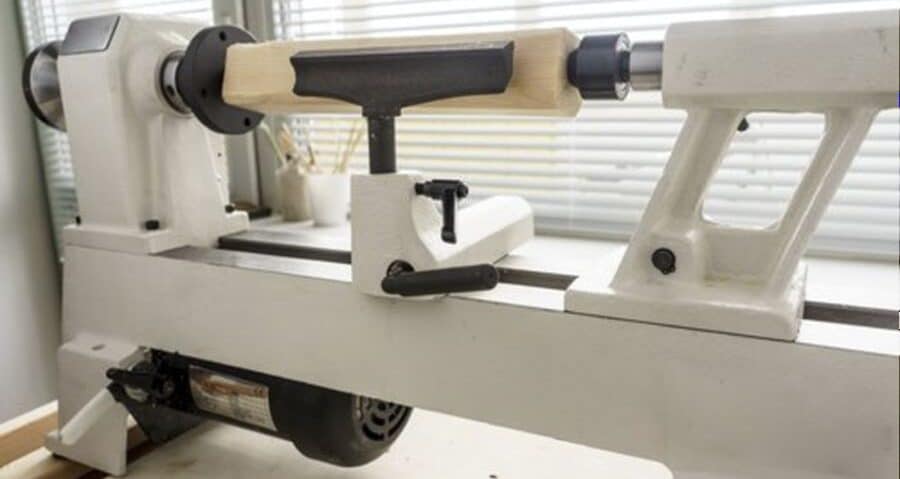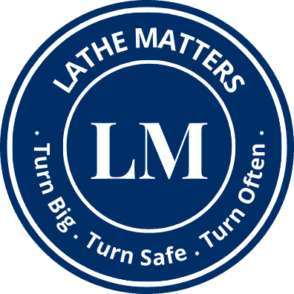Disclaimer: As an Amazon affiliate, I may earn a small percentage from qualifying purchases. This is at no extra cost to you. Learn more here.
Last Updated on January 17, 2025 by Larry Edwards
Generally, the Benchtop lathes, which are commonly known as woodturning lathe, comes in 3 sizes. Mini, Midi, and Full-sized Lathe. Each of them has their qualities, characteristics, and productivity limitations.
So what is a Midi Lathe?
Saving both workspace and budget, the Midi Lathe comes in between mini and full-sized lathe. Currently costing between $300 to $700, these lathes took over the market since 1990. Some think that it’s just a marketing trick, but there are apparent differences in features and specifications.
Now let’s find out some more about Midi Lathes to see why it’s not a marketing hype only. You can See my comprehensive research on some of the best modern midi wood lathe.
To look for that, we need to see what the differences are and what they do.
Related article: Wood lathe history and definition
Characteristics of A Midi Lathe

Midi lathe first came into play in the late 90s. They raised the bar for the entire industry and showed what a compact lathe is capable of.
They generally have a minimum of 12 inches to 14 inches of bed swings. This article will help you with a clear definition of lathe swing.
So you can easily turn things like pens, baseball bats, wood platters, wood bowls, lidded boxes, hollow forms, ornaments, toys, and any furniture spindles you like.
If equipped properly, it will help you to cut, thread, slot, and even pattern holes with an excellent finish.
A Benchtop lathe is basically consists of 4 major parts-
- Motor
- Headstock
- Tailstock
- Banjo and the tool-rest
- Bed
And the compact standard lathe will mostly be featured with-
- DC motor with electronic variable speed control
- Forward to reverse directional control
- Headstock and tailstock Spindle
- A quick-change belt pulley system
- Morse 2 spindle taper
- Digital readout meter
- external bed extension if you want.
The spindle speed range is generally 60 to 4000 rotation per minute. If it’s an electronic variable, you can turn the woods without having to change the belt. A Speed knob will control it.
The cost starts from 400 to up to 1000 US dollars depending on the quality, features, and brand. You can find a quality one under 600 US dollars budget.
Difference Between Midi Lathe and Mini Lathe
Mini and Midi are quite the same, but the significant differences, of course, here are the size and the horsepower.
Let’s give you some basic differences between the Mini and Midi.
Mini Wood Lathe
Generally has a swing of 8″ to 10″ over the bed. The length between the center usually would be 12″ to 15″. You can have variable speed control DC motor in both the midi and mini.
This small lathe is gorgeous when it comes to turning a workpiece that is small in size like pens, bottle stoppers, pet calls, and even bowls under 8 inches in diameter.
As turning pens have an old connection with the invention of mini-lathes, so people often buy them to turn pens, and these lathes are killing it. The price range here for the Mini’s is between 150-500 US dollars.
Anyone likely to enter into the turning world without risking much, A nicely featured Mini lathe could be a safe move. See a few examples in that linked article.
Midi Lathe
Now Midi lathes come with a robust motor and capability to turn larger bowls and spindle, enabling it to uphold or support more significant wood blanks.
Horsepower rating is the big difference between the mini and midi. With 3/4 to 1 HP motor, the bed swing starts from 12″ with some going up to 14″.
The length between the center can be extended up to 40″ if you add a bed extension to turn things like table legs or baseball bats, table legs, or other furniture.
Well, the price range? The price range for a standard quality midi lathe stays between $400 and $1000.
Midi lathes are much beefier in both swing and center to center distance than the minis.
Accessories you will get out of the box
Here is the funny part many of us get this wrong. Your lathe is not the last thing you are buying. It is the fundamental thing you’d buy. You need other tools to operate this machine, and by operating, I mean turning.
You’ll be needing different cutting tools (like- bowl gouge, roughing gouge), maybe a scraper, parting tools, skew chisels, a lathe jaw chuck, extra tool rests in some cases, extra live centers or drive centers, and stuff.
Now, you don’t need them all to get started obviously, but you’re gonna need them anyway.
The accessories you’ll get out of the box are very basic-
- A Faceplate
- Two sizes of tool rest, smaller and longer
- A wrench
- Attached tool holders
- Allen wrenches to remove the faceplate
- A knockout bar
- Drive centers
- Live centers
You can start with some basic cutting tools, set-up the lathe wherever you wanna mount it, score some wood, and then start turning.
Why You Should Own A Midi Lathe
A midi lathe is quite a handy tool to make your tasks easier at a lower price than the full-sized lathe saving your floor space without compromising the quality.
The role of this machine is that you can rotate or spin items such as bowls, wooden doorknobs, wooden stool legs, pens, or other items using wood that is usually 12-14″ in diameter. Tailpiece extenders are also a plus point for turning larger wood pieces like baseball bats or furniture. Here are more projects you can make with a midi lathe:
In addition to the tailpiece extenders, the compact size makes them very convenient if you lack in space and, of course, the price that you don’t want to spend so early to acquire a full-sized lathe.
So, midi lathes are an excellent alternative to standard wood lathes.
Conclusion
There are other types of lathes also for mass production or more prominent jobs, and they cost more than the standard hobby lathes. This article will help get more ideas about different types of lathes and their prices.
The last thing I would like to say again is, midi lathes can’t give you all the facilities of a 2 HP full-sized lathe when you are after something big.
But with adding some riser block underneath the bed and an extra bed extension, you can get more swing and distance you need to hit some serious work.
Ready to buy a midi lathe? Check out our best midi lathes review post.
Turn big, Turn safe. Welcome to the turning world!
